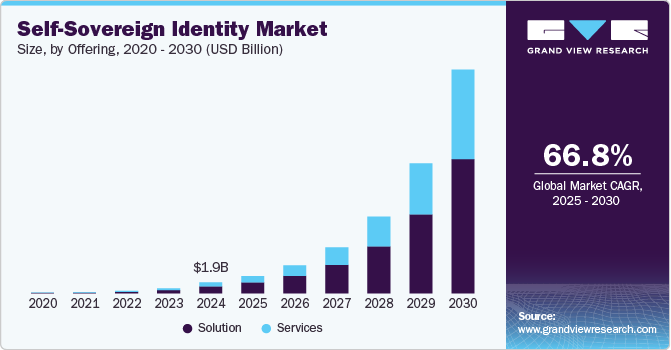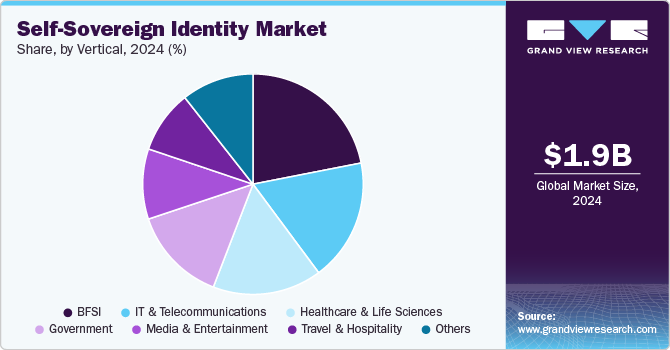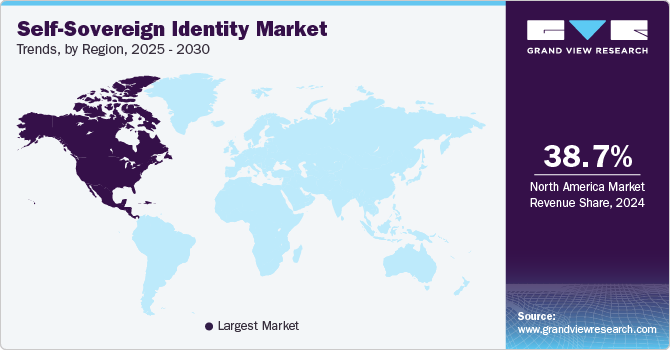- Home
- »
- Network Security
- »
-
Self-Sovereign Identity Market Size, Industry Report, 2030GVR Report cover
![Self-sovereign Identity Market Size, Share & Trends Report]()
Self-sovereign Identity Market (2025 - 2030) Size, Share & Trends Analysis Report By Offering (Solution, Services), By Identity Type (Biometrics, Non-biometrics), By Network, By Vertical, By Region, And Segment Forecasts
- Report ID: GVR-4-68040-554-0
- Number of Report Pages: 200
- Format: PDF
- Historical Range: 2018 - 2023
- Forecast Period: 2025 - 2030
- Industry: Technology
- Report Summary
- Table of Contents
- Segmentation
- Methodology
- Download FREE Sample
-
Download Sample Report
Self-sovereign Identity Market Summary
The global self-sovereign identity market size was estimated at USD 1.9 billion in 2024 and is projected to reach USD 38,085.4 million by 2030, growing at a CAGR of 66.8% from 2025 to 2030. The self-sovereign identity (SSI) market is gaining momentum as organizations seek secure, decentralized ways to manage digital identities.
Key Market Trends & Insights
- North America leads the global self-sovereign identity (SSI) market accounting for leading share of 38.7% in 2024.
- In terms of offering, the solution segment dominates the Self-Sovereign Identity (SSI) market is anticipated to hold 63.9% in 2024.
- In terms of network, the Permissioned segment is expected to account for the largest market revenue share in 2024.
- In terms of vertical, the BFSI segment held the largest market revenue share in 2024.
Market Size & Forecast
- 2024 Market Size: USD 1.9 Billion
- 2030 Projected Market Size: USD 38,085.4 Million
- CAGR (2025-2030): 66.8%
- North America: Largest market in 2024
Adoption is being fueled by mobile-first solutions that give users control over their identity data through digital wallets. Integration of biometrics with verifiable credentials is enhancing both security and user convenience, especially in high-trust environments.Standardization efforts, such as W3C Verifiable Credentials, are enabling interoperability and expanding SSI use cases across industries and borders. For instance, in August 2024, NEC Corporation, an information technology and electronics corporation in Japan, introduced a cardless digital employee ID system for 20,000 employees in Japan, combining facial recognition with Microsoft Entra Verified ID to enable secure, self-sovereign identity management via smartphone. This system empowers employees to control their identity data while enhancing workplace security and efficiency under NEC’s Client Zero innovation approach.
On-device identity proofing is becoming a pivotal trend in digital identity management, allowing users to authenticate directly on their devices without relying on centralized databases. This approach significantly enhances data security by reducing the exposure of personal information. It also aligns with global privacy regulations, such as GDPR and CCPA, which emphasize user control and data minimization. This decentralized model supports Self-Sovereign Identity (SSI), giving users full control over their credentials and the ability to disclose only necessary information.

As industries such as finance and healthcare continue to adopt digital identity solutions, on-device proofing provides a secure and compliant method of verification. For instance, in November 2024, Privately SA and Privado ID, a U.S.-based privacy-first identity infrastructure company, partnered to develop a privacy-first, on-device age verification solution that utilizes AI-driven age estimation and Self-Sovereign Identity to ensure compliance without compromising user privacy. This solution allows users to verify their age once and reuse that verification across multiple platforms, supporting sectors such as adult content, gaming, and streaming.
The ongoing digital transformation across sectors such as finance, healthcare, and government is creating a growing demand for efficient and secure digital identity solutions. As businesses and public services increasingly move online, the need for robust identity management systems that ensure both security and user privacy has become critical. Self-Sovereign Identity (SSI) is perfectly positioned to address these challenges, offering a decentralized approach that gives users full control over their personal data. With SSI, individuals can securely manage and share their identities without relying on centralized databases, which reduces the risks of data breaches. As more sectors undergo digitalization, SSI is emerging as a key solution to streamline identity management, enhance security, and promote user autonomy in the digital world.
Growing concerns about data breaches and identity theft are fueling the demand for Self-Sovereign Identity (SSI) solutions that empower individuals to have greater control over their personal information. As cyber threats continue to rise, people are increasingly seeking ways to safeguard their data from unauthorized access. At the same time, regulations such as GDPR and similar laws worldwide are pushing organizations to adopt privacy-preserving identity management systems. These regulations emphasize the need for secure data handling practices, encouraging the use of decentralized systems such as SSI that put individuals in charge of their identity data. This trend is driving the widespread adoption of SSI as businesses and governments work to meet privacy standards while enhancing user trust and security.
Offerings Insights
In terms of offering, the solution segment dominates the Self-Sovereign Identity (SSI) market is anticipated to hold 63.9% in 2024. This growth is driven by the increasing demand for secure and privacy-preserving identity management solutions across various industries. Organizations are adopting SSI solutions to enhance user control over personal data while ensuring compliance with privacy regulations. Moreover, the rise of digital transformation and the need for secure, decentralized identity systems further support the dominance of this segment. As more businesses integrate SSI solutions into their infrastructure, the segment’s market share is expected to continue growing.
The services segment is projected to grow significantly over the forecast period due to the increasing demand for support and consultation in implementing self-sovereign identity solutions. As organizations adopt SSI technologies, they require expert guidance in integrating and managing these systems within their existing infrastructure. The need for ongoing maintenance, updates, and security services is also driving this growth. Moreover, as the adoption of SSI expands across industries, demand for services such as training, compliance assistance, and identity verification will increase. This trend is expected to contribute to the overall expansion of the SSI market.
Identity Type Insights
The Biometrics segment has accounted for the highest revenue in the Self-Sovereign Identity (SSI) market, driven by the increasing demand for secure, user-friendly, and efficient identity verification methods. Biometrics, such as facial recognition, fingerprint scanning, and iris recognition, provide a high level of accuracy and security, making them ideal for SSI applications. As data security and privacy concerns continue to rise, biometric solutions offer a reliable method for ensuring that individuals’ identities are protected. Their use is expanding across industries such as banking, healthcare, and government, where secure authentication is paramount. This segment is expected to maintain its dominant position as more organizations turn to biometrics to enhance their SSI implementations.
The Non-biometrics segment is expected to experience significant growth in the coming years, as organizations seek diverse and flexible methods for identity verification. Non-biometric solutions, such as passwordless authentication, token-based verification, and digital certificates, offer users alternative methods to securely manage their digital identities. With an increasing focus on user privacy and compliance with global regulations, these non-biometric solutions are becoming more appealing to industries outside the traditionally biometric-focused sectors. Moreover, the advancement of technologies such as blockchain and cryptography is boosting the adoption of non-biometric identity management systems.
Network Insights
The Permissioned segment is expected to account for the largest market revenue share in 2024, due to its controlled access and enhanced security features. Organizations prefer permissioned networks for Self-Sovereign Identity (SSI) as they allow only authorized entities to participate, ensuring greater trust and compliance. This model is widely used in sectors such as finance, healthcare, and government, where regulatory requirements and data sensitivity are high. Its structured governance makes it easier to manage identities and maintain accountability within a closed ecosystem. As a result, the permissioned model continues to dominate enterprise-level SSI deployments.
The Permissionless segment is projected to grow significantly over the forecast period, driven by the demand for open and decentralized identity ecosystems. In a permissionless network, anyone can participate without prior approval, promoting inclusivity and innovation. This model aligns closely with the core principles of SSI, including user autonomy and decentralization. As blockchain and Web3 technologies mature, permissionless systems are gaining traction in communities seeking transparency and global interoperability. The rising adoption of decentralized applications (dApps) and open digital economies is expected to fuel the growth of this segment.
Vertical Insights
The BFSI segment held the largest market revenue share in 2024, driven by the sector’s high demand for secure, compliant, and efficient digital identity solutions. Financial institutions are adopting Self-Sovereign Identity (SSI) to streamline customer onboarding, reduce fraud, and enhance data privacy. The ability to verify identities without relying on centralized systems aligns well with regulatory requirements such as KYC and AML. Moreover, SSI improves user trust and experience by giving individuals control over their personal data. As digital banking and fintech services expand, the BFSI sector continues to lead in SSI adoption.

The Healthcare & Life Sciences segment is expected to experience significant growth over the forecast period due to increasing digitalization and the need for secure patient identity management. SSI can help protect sensitive health data while enabling seamless access to medical records across providers and platforms. The ability to manage and share verified credentials such as vaccination status or medical history supports both patient autonomy and regulatory compliance. Growing concerns around data breaches and the need for interoperability are also driving adoption. As personalized medicine and telehealth services rise, SSI is becoming a critical enabler of secure and patient-centered care.
Regional Insights
North America leads the global self-sovereign identity (SSI) market accounting for leading share of 38.7% in 2024. North America hold a significant share of the Self-Sovereign Identity (SSI) market due to early technology adoption and strong digital infrastructure. Governments and enterprises are increasingly investing in decentralized identity systems for secure data management. Regulatory focus on privacy and digital trust is fueling market growth. Moreover, advancements in blockchain and identity verification technologies are accelerating SSI implementation across sectors.

U.S. Self-sovereign Identity Market Trends
The U.S. self-sovereign identity (SSI) Market driven by rising concerns around data breaches and digital fraud. The country's tech ecosystem supports rapid innovation in blockchain-based identity solutions. Financial services, healthcare, and government agencies are major adopters of SSI technologies. Regulatory developments and enterprise digitization continue to push demand for decentralized identity frameworks.
Europe Self-sovereign Identity Market Trends
Europe is witnessing strong growth in the self-sovereign identity (SSI) market, supported by strict data privacy regulations such as GDPR. The region's focus on digital sovereignty and user-centric identity aligns well with SSI principles. Initiatives such as the European Digital Identity Wallet are accelerating adoption across member states. Cross-border digital services and public-private collaborations are further driving market expansion.
Asia Pacific Self-sovereign Identity Market Trends
The Asia Pacific region is poised for rapid growth in the self-sovereign identity (SSI) market, driven by large-scale digital transformation across countries. Governments and enterprises are adopting SSI to enhance security, privacy, and efficiency in identity verification. Rising smartphone usage and internet connectivity support the adoption of mobile-first SSI solutions. Countries such as Japan, South Korea, India, and Australia are leading regional efforts in blockchain-based identity systems.
Key Self-Sovereign Identity Company Insights
Some of the key companies in the Self-Sovereign Identity (SSI) market include IBM Corporation, IDEMIA, NEC Corporation, Microsoft and others. Organizations are focusing on increasing customer base to gain a competitive edge in the industry. Therefore, key players are taking several strategic initiatives, such as mergers and acquisitions, and partnerships with other major companies.
-
Microsoft is advancing self-sovereign identity (SSI) solutions through its Entra Verified ID platform. This platform enables individuals to manage and control their identities securely, allowing them to share verified information with various services without relying on centralized databases. Microsoft’s approach emphasizes user ownership of personal data while integrating decentralized identity protocols such as blockchain.
-
Ping Identity is enhancing self-sovereign identity solutions through its identity management platform. Ping Identity is addressing the growing need for secure authentication and verification processes across multiple sectors. Their developments help businesses meet compliance standards while improving security and reducing the risk of identity fraud.
Key Self-Sovereign Identity Companies:
The following are the leading companies in the self-sovereign identity (SSI) market. These companies collectively hold the largest market share and dictate industry trends.
- AU10TIX
- ConsenSys
- ConnectID
- IBM Corporation
- IDEMIA
- NEC Corporation
- Microsoft
- Ping Identity
- SecureKey Technologies
- Wipro
Recent Developments
-
In November 2023, ConnectID partnered with Ping Identity, a U.S.-based software company, to integrate its digital identity solution into the PingOne Cloud Platform, enabling seamless and privacy-first identity verification. This collaboration enhances user control and streamlines digital experiences while supporting compliance with Australia’s Trusted Digital Identity Framework (TDIF).
-
In March 2023, AU10TIX partnered with Microsoft to launch Reusable ID, a solution that enhances verifiable credentials (VC) architecture for identity management. The collaboration utilizes Microsoft Entra Verified ID, allowing businesses to simplify ongoing ID verification and reduce costs. AU10TIX’s identity verification technology integrates with decentralized systems, enabling users to store and share their identity information securely via tamper-proof digital wallets. This solution aims to address compliance, privacy, and fraud challenges.
Self-sovereign Identity Market Report Scope
Report Attribute
Details
Market value in 2025
USD 2,951.8 million
Revenue forecast in 2030
USD 38,085.4 million
Growth rate
CAGR of 66.8% from 2025 to 2030
Base year for estimation
2024
Historical data
2018 - 2023
Forecast period
2025 - 2030
Quantitative units
Revenue in USD million/billion, and CAGR from 2025 to 2030
Report coverage
Revenue forecast, company ranking, competitive landscape, growth factors, and trends
Segment scope
Offering, identity type, network, vertical, region
Region scope
North America; Europe; Asia Pacific; Latin America; Middle East & Africa
Country scope
U.S.; Canada; Mexico; Germany; UK; France; China; Japan; India; Australia; South Korea; Brazil; KSA; UAE; South Africa
Key companies profiled
AU10TIX; ConsenSys; ConnectID; IBM Corporation; IDEMIA; NEC Corporation; Microsoft; Ping Identity; SecureKey Technologies; Wipro
Customization scope
Free report customization (equivalent up to 8 analysts’ working days) with purchase. Addition or alteration to country, regional & segment scope
Pricing and purchase options
Avail customized purchase options to meet your exact research needs. Explore purchase options
Global Self-sovereign Identity Market Report Segmentation
This report forecasts revenue growth at global, regional, and country levels and provides an analysis of the latest industry trends and opportunities in each of the sub-segments from 2018 to 2030. For this study, Grand View Research has segmented the global self-sovereign identity (SSI) market report in terms of offering, identity type, network, vertical and region.
-
Offering Outlook (Revenue, USD Million, 2018 - 2030)
-
Solution
-
Services
-
-
Identity Type Outlook (Revenue, USD Million, 2018 - 2030)
-
Biometrics
-
Non-Biometrics
-
-
Network Outlook (Revenue, USD Million, 2018 - 2030)
-
Permissioned
-
Permissionless
-
-
Vertical Outlook (Revenue, USD Million, 2018 - 2030)
-
BFSI
-
Government
-
Media & Entertainment
-
Travel and Hospitality
-
Healthcare & Life Sciences
-
IT & Telecommunications
-
Others
-
-
Regional Outlook (Revenue, USD Million, 2018 - 2030)
-
North America
-
U.S.
-
Canada
-
Mexico
-
-
Europe
-
UK
-
Germany
-
France
-
-
Asia Pacific
-
China
-
Japan
-
India
-
Australia
-
South Korea
-
-
Latin America
-
Brazil
-
-
Middle East & Africa (MEA)
-
KSA
-
UAE
-
South Africa
-
-
Frequently Asked Questions About This Report
b. The global self-sovereign identity market size was estimated at USD 1,856.0 million in 2024 and is expected to reach USD 2,951.8 million in 2025.
b. The global self-sovereign identity market is expected to grow at a compound annual growth rate of 66.8% from 2025 to 2030 to reach USD 38,085.4 million by 2030.
b. North America dominated the SSI market with a share of 38.7% in 2024. This is attributable to the region's advanced digital infrastructure, strong regulatory support for data privacy, and widespread adoption of decentralized identity solutions.
b. Some key players operating in the self-sovereign identity market include AU10TIX, ConsenSys, ConnectID, IBM Corporation, IDEMIA, NEC Corporation, Microsoft, Ping Identity, SecureKey Technologies, and Wipro.
b. Key factors driving the market growth include increasing demand for data privacy, rising adoption of digital identities, advancements in blockchain technology, and growing need for secure and user-controlled identity solutions.
Share this report with your colleague or friend.
Need a Tailored Report?
Customize this report to your needs — add regions, segments, or data points, with 20% free customization.

ISO 9001:2015 & 27001:2022 Certified
We are GDPR and CCPA compliant! Your transaction & personal information is safe and secure. For more details, please read our privacy policy.
Trusted market insights - try a free sample
See how our reports are structured and why industry leaders rely on Grand View Research. Get a free sample or ask us to tailor this report to your needs.










